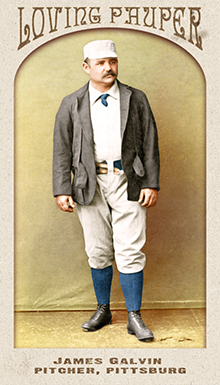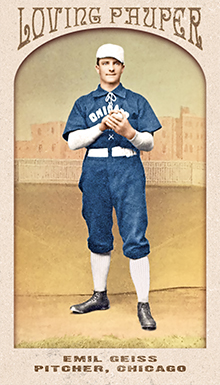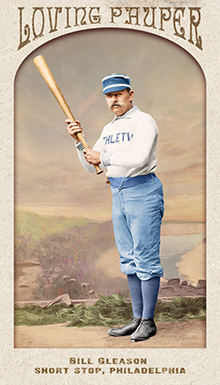
- Series: 1880s: Loving Paupers
- City: Pittsburgh
- Team: Alleghenys
- League: National League
- Hall: National Baseball Hall of Fame
James Francis Galvin (1856-1902) sported some colorful nicknames: Pud, Gentle Jeems and The Little Steam Engine, indicative of his renown. Pud was baseball’s first 300-game winner. He pitched for six teams over 15 years, and remains the only player to win 20+ games in ten seasons and not win a pennant. Only Cy Young pitched more innings or hurled more complete games, a testimony to the extraordinary demands placed on starters in the 19th century. Perhaps no pitcher of any era accomplished so much by overcoming a distinct physical limitation. In Galvin’s case, it was his small hands which left him unable to completely grip a baseball. He couldn’t throw the curve so he adapted, becoming an expert in “drops, straight balls and the different artifices known to pitchers to deceive the batter” as he told a friend. As his steam engine nickname suggests, Pud just rolled right at the hitter with power and durability yet with amazing finesse, especially in holding runners on base. Buck Ewing was a great admirer and said he wouldn’t have had anyone attempting steals with Galvin on the mound.
- Galvin threw no-hitters in 1880 and ‘84
- Began and ended his long career in St Louis with the NA’s Brown Stockings and NL’s Browns
- Elected to Hall of Fame: 1965
Auction History
Cartophilia
Old Judge Pose: 177-2

- Series: 1880s: Loving Paupers
- City: Chicago
- Team: White Stockings
- League: National League
Emil Geiss (1865-1911) emigrated from his birthplace, Villmar Germany, to Chicago. The youngster began his experience in professional baseball out in Colorado with the Pueblo Pastimes of the CO State League in 1885. The scanty records for minor league play in those days record Emil started two games, finished them both and went 1-1. There is no data for Geiss’ activities the following year, but one might suppose he did something somewhere to impress the Chicago White Stockings as the National League power thought fit to sign Emil for the ‘87 season. Whatever Cap Anson’s hopes were, they died aborning as Geiss languished with the team. He got shelled in his one start (11 runs, eight earned) and not only left the major leagues, he left his adopted land. Geiss signed the following two seasons with London Ontario Canada’s Tecumsehs of the International Association and stayed for the 1889 campaign when the Tecumsehs joined the International League. In those two years Geiss was 21-21 . But for his sole outing in Chicago, he would have completed his pro tenure with a symmetrical record of 22-22.
- There is no doubt Emil belonged in the pitcher’s box as his hitting gave no indication he could perform anywhere else. He never cracked the .200 mark and was one for 12 with the White Stockings. His three errors in his brief time in the majors suggest it wasn’t just his bat that would be a detriment to longevity at that level
- The reason Geiss had twelve at bats in Chicago is that Anson put him at first base and second base in two other appearances
- Emil’s older brother Bill also saw major league duty, playing two seasons. He debuted with Baltimore in the American Association in 1882 and then joined the Detroit Wolverines of the NL in ‘84
Auction History
Cartophilia
Old Judge Pose: 182-2

- Series: 1880s: Loving Paupers
- City: Philadelphia
- Team: Athletics (AA)
- League: American Association
William G. Gleason (1858-1932) was an American Association shortstop for three teams from 1882-89. During those eight seasons Gleason hit .267. He debuted with his hometown St. Louis Brown Stockings and participated in their three pennants in '85, '86 and '87. He was an everyday player and increased the number of games played every year with the club, culminating in '87 when he appeared in 135 games with a fine .288 average. St. Louis management must have anticipated a decline was in store. He was traded to Philadelphia's Athletics in '88, where his hitting fell off to .224. Philly dealt him to the Louisville Colonels for his final campaign. Gleason saw action in only 16 games in 1889. He stayed in pro ball for two more minor league seasons with Washington of the Atlantic Association in 1890 and finished up with the Rockford Hustlers of the Illinois-Iowa League the following year where he recorded by far the highest average on a squad that included eight other past or future big leaguers.
- In a storied and rowdy “championship” contest following the 1885 season, Gleason's Browns vied with the formidable White Stockings. Bill was at the center of the storm as his throw to first was ruled late, infuriating the home folks and precipitating a long row in which Cap Anson refused to allow the Chicago umpire to be replaced. Comiskey called his team off the field which led to a forfeit of the first game. The “Series” ended in a tie.
Auction History
Cartophilia
Old Judge Pose: 193-2


